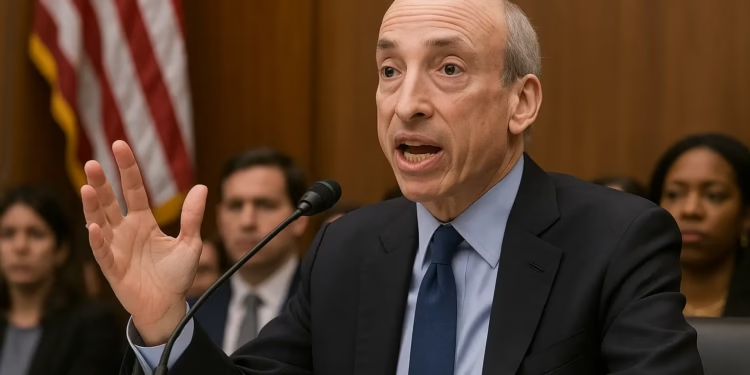SSEC Chair Paul Atkins confirmed this week that finalizing a crypto regulatory sandbox remains his top priority despite the ongoing government shutdown, as the agency races to reverse a four-year exodus of blockchain developers to Europe and Asia under the previous administration’s enforcement-heavy approach.
“As you know, we’ve had four years, at least, of repression of that industry, with the result of pushing things abroad rather than having innovation being done here,” — Paul Atkins, Chair, SEC, said during his remarks.
Atkins’ comments allude to the previous administration under former SEC Chair Gary Gensler, who was widely criticized by crypto advocates for an “enforcement-first” regulatory stance.
Many industry participants argue that the lack of clear rules under Gensler’s leadership drove U.S.-based blockchain developers and exchanges to relocate to more crypto-friendly jurisdictions such as Europe, Singapore, and the UAE.
The new SEC innovation exemption seeks to reverse that trend by providing startups and developers with a supervised environment to experiment with blockchain applications without facing immediate enforcement risks.
Learning from Europe’s regulatory sandbox
According to Atkins, the SEC innovation exemption will model aspects of the European Blockchain Regulatory Sandbox, launched by the European Commission in 2023. The sandbox enables regulators and innovators across France, Germany, Spain, Italy, and other EU nations to collaborate in testing blockchain applications in a legally protected framework.
The U.S. is catching up to Europe in this regard, said Kadan Stadelmann, Chief Technology Officer at Komodo Platform, in an interview with crypto.news. The European Blockchain Regulatory Sandbox provides increased legal certainty and more options for consumers which is something the U.S. has been missing.
The introduction of the SEC innovation exemption could help close that regulatory gap by fostering cooperation between U.S. regulators, startups, and established financial institutions. The framework is expected to encourage cross-sector experimentation in digital securities, stablecoins, tokenized assets, and decentralized finance (DeFi) while maintaining investor protection through conditional oversight.
Atkins, a long-time advocate for a balanced regulatory model, has argued that innovation should not be stifled by unclear or punitive policies.
“I want to be welcoming to innovators,” he said, “and have them feel like they can do something here in the United States, so they don’t have to flee to some foreign jurisdiction.”
Addressing crypto’s brain drain and investor confidence
The SEC innovation exemption was first proposed in June 2024, when Atkins instructed staff to explore a conditional relief framework for blockchain projects. By September, he confirmed plans to formalize the exemption by the end of the year which is a move many analysts believe could reestablish the U.S. as a hub for Web3 development.
Industry observers say the initiative could mitigate the ongoing “brain drain” of developers leaving the U.S. due to regulatory uncertainty. Over the past four years, major firms like Coinbase, Ripple, and Circle have expanded their operations abroad, citing clearer rules in Europe and Asia.
The exemption will help retain talent, encourage domestic innovation, and build investor confidence in U.S.-based crypto ventures, Kadan Stadelmann, CTO, Komodo Platform, added. We can expect faster adoption of technologies, regulatory tweaks, and more harmonization with the global crypto landscape once it’s implemented.
Atkins’ push for the SEC innovation exemption also reflects the broader economic strategy of the Trump administration, which aims to position the United States as a digital asset leader. The policy shift signals a significant departure from the previous SEC era marked by enforcement actions against major crypto entities rather than collaborative rule-making.
A pivotal moment for U.S. digital asset policy
The rollout of the SEC innovation exemption could redefine how the United States approaches digital asset regulation. By offering a structured yet flexible environment for blockchain experimentation, the SEC hopes to strike a balance between innovation and investor protection.
Analysts suggest that the exemption could lead to measurable benefits across several fronts:
- Increased venture capital inflows into U.S.-based blockchain startups
- Enhanced collaboration between regulators and innovators
- Reduction in compliance ambiguity for emerging projects
If successful, the policy could mirror the impact of Europe’s sandbox, which has already accelerated blockchain adoption across industries like supply chain, finance, and healthcare.
As global competition for blockchain leadership intensifies, the SEC innovation exemption stands as a critical step toward restoring the U.S.’s relevance in the digital economy.
“Regulatory clarity and experimentation are not mutually exclusive,” said Lisa Braganca, a former SEC enforcement attorney, in a Forbes commentary. “If the SEC can balance both, it can make the U.S. a leader again not a laggard in digital asset innovation.”
The crypto community now watches closely as the SEC prepares to formalize the exemption, potentially marking the agency’s most significant shift in digital asset policy in over a decade.












